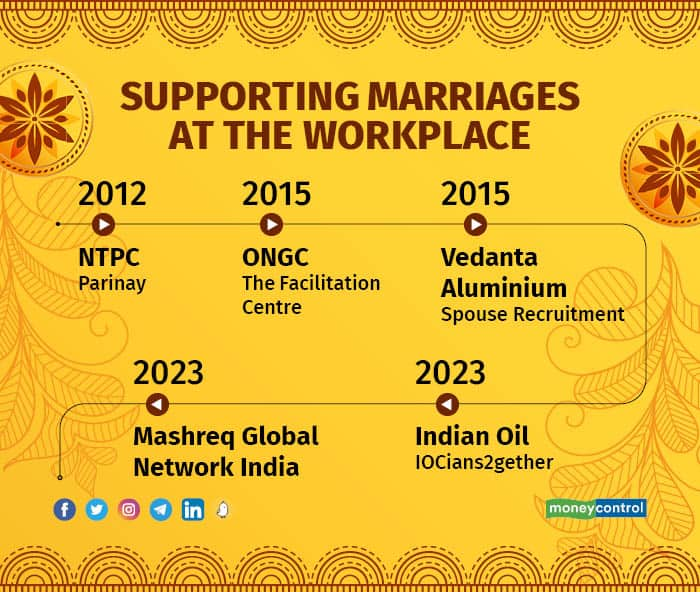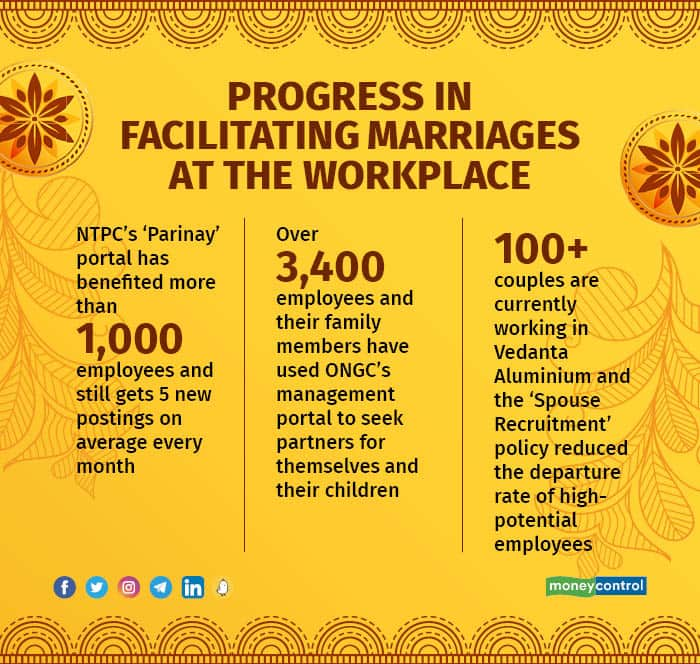



Married couples at work aren’t common. That’s because there’s a fear of favouritism and the possibility of personal matters getting mixed up in professional environments. There could be conflicts of interest.
However, some companies have been outliers in such matrimonial matters. Public sector undertakings Oil and Natural Gas Corporation, NTPC and Indian Oil Corporation allow and facilitate the marriage of employees. ONGC and NTPC even help current and former employees find partners for their children and siblings.
ONGC introduced its marriage service portal in 2015, providing a platform for employees to upload their profiles and search for potential matches.
At NTPC, the ‘Parinay’ portal started in 2012 as an internal matrimonial networking site and has benefited more than 1,000 employees. It still gets five new postings every month. NTPC now plans to upgrade the site and add features like profile pictures, a company official told Moneycontrol.
The 'IOCians2gether' platform was launched in January 2023 to create “work and life partnerships” within Indian Oil. It successfully facilitated the marriage of a couple in the research and development department in February.
Not just PSUs
Given the popularity of government jobs in India, talent retention is not seen as a tough game for PSUs. However, private companies, including multinationals operating in India, are not far behind and are experimenting with their HR policies.
Vedanta Aluminium implemented the ‘Spouse Recruitment’ policy in 2015, encouraging employees to submit their spouses’ resumes to HR managers. A cross-functional executive committee then interviews and evaluates candidates based on the recruitment criteria to ensure that the selection is merit-based.
“As our manufacturing operations are often situated in remote regions, working spouses' potential for meaningful career opportunities is a significant factor in an employee's career choices,” Rahul Sharma, CEO of Vedanta’s aluminium business, told Moneycontrol.
ALSO READ | Employees turning social media influencers is the next India Inc challenge after moonlighting
Currently, over 100 couples work in Vedanta Aluminium and the initiative has brought in the ability to hire top professionals laterally, increased the pool of skilled talent, reduced the departure rate of high-potential employees, and shortened the time taken to fill crucial positions, Sharma said.

To understand the evolving needs of the workforce in India, Mashreq Global Network, a subsidiary of Mashreq Bank, took feedback from employees, managers, division heads, and even new employees after the pandemic. Following this, it made a major policy change and allowed the employment of close relatives, siblings and spouses without any conflict of interest.
New retention strategy?
Although allowing married couples to work in an organisation helps in retention to a limited extent, it’s hardly a reflection of the overall retention rate. Experts said the fact that very few companies allow such arrangements is itself proof that the policy is not popular.
Calling such policies a “tick in the HR handbook” amid a focus on diversity and inclusion, Kamal Karanth, cofounder of specialist staffing company Xpheno, said colleagues turning spouses are a statistical minority, unlike other cohorts like age, gender, location and parental status when it comes to retention strategy.
“Given the relatively smaller circle of relevance, the retention impact, if any, is limited to specific individual cases as outliers,” he said, adding that many enterprises handle this on a case-to-case basis rather than as a documented policy process.
“The frequency of this occurrence allows employers to not sweat over it as a major retention or talent attraction strategy,” he said.
Employer branding
According to employer branding experts, companies try innovative ways to attract and retain talent.
“Talent usually marries into the same pedigree or chooses partners with similar educational and professional backgrounds so that there is companionship and understanding in marriage,” said Amandeep Kaur, founder of Phoenix TalentX Branding, an employer brand marketing agency.
ALSO READ | Rs 1 lakh for an MNC job: How 'helpers’ game corporates
It makes sense to hire from a readymade talent pool that is already exposed to the employer brand and convinced that the company is a great place to work, she said, adding that firms also save on referral bonuses or relocation costs.
“Offer acceptance rates are also high for such cases,” Kaur said.
In a nutshell, it is a retention strategy that works like an employer branding strategy.

Will others follow suit?
The risks of married couple-employees and the continuous need to avoid conflicts make it hard for employers to adopt such a policy. Besides, big corporations across the world such as McDonald’s have been against the idea of co-workers dating, let alone allowing them to marry and work together, especially in a senior-junior relationship.
Xpheno’s Karanth said adopting employee marriage as a documented policy will need a strong internal context.
“In the absence of any regulatory angles on this, the drive to follow suit will be comparatively low,” he said.
Undoubtedly, there are professionals who prefer a well-defined boundary between work and home. It is reasonable to assume that people not opting for such policies may become victims of favouritism and may damage employer branding.
“What may not work is a negative commentary on social media or employee review sites if the couples face a lay-off scenario. Their families and friends also become emotional during such crisis moments and start lambasting the employer brand for being insensitive,” said Phoenix’s Kaur.
Discover the latest Business News, Sensex, and Nifty updates. Obtain Personal Finance insights, tax queries, and expert opinions on Moneycontrol or download the Moneycontrol App to stay updated!
Find the best of Al News in one place, specially curated for you every weekend.
Stay on top of the latest tech trends and biggest startup news.